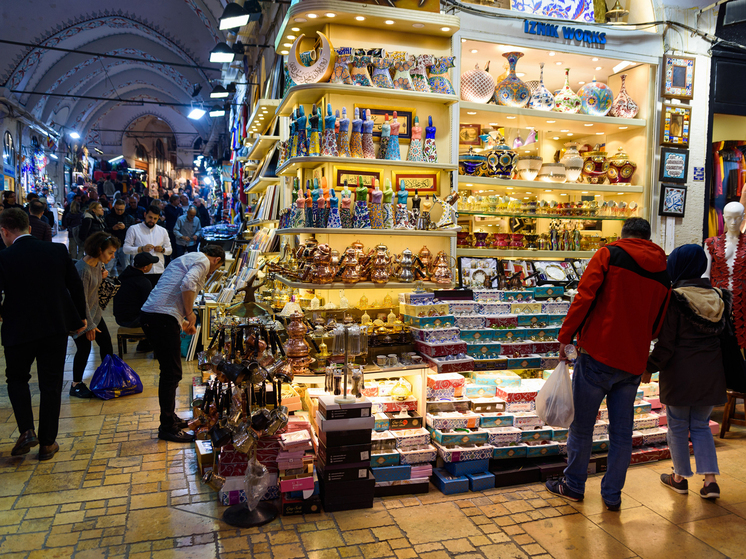The fall of the lira did not make Turkish shopping more accessible for Russians: the expert named the reason
[ad_1]

Inflation eats up changes in the exchange rate, and merchants try to cash in on tourists
This week, for one US dollar in Turkey, they gave 23 lira, which became a historical anti-record. Surprisingly, the victory of head of state Recep Tayyip Erdogan in the presidential elections in May only worsened the situation in the foreign exchange market. According to Bloomberg analysts, such a strong lira subsidence was caused by the refusal of banks from foreign exchange interventions. It is curious that the cheapening of the lira did not lead to an influx of Russians to Turkey for shopping. Why this once popular form of recreation has become an expensive pleasure for compatriots – in the material “MK”.
A trip to Turkey, even before the fall of the lira in May, gradually became an expensive trip for Russians. Turkish hotels have raised prices for holidays for citizens of our country since mid-spring. At the same time, they did not change the cost of services for Europeans. According to Aleksan Mkrtchyan, vice-president of the Alliance of Travel Agencies of Russia, local businessmen are aware that there is no alternative to rest in Turkey for Russians. Our compatriots can no longer go to Cyprus, Malta, Greece or other EU resorts, where hundreds of thousands of travelers from our country rested in 2019. Due to sanctions, this direction is closed today. Understanding this, hotels in Turkey have raised prices for holidays for Russian citizens by 20% compared to last year. According to the expert, they did not do this with respect to tourists from Western Europe. After all, Cyprus and Greece, due to the lack of Russian vacationers, were forced to dump in order to attract travelers, so if Turkey raises prices for Europeans, they will simply choose a cheaper destination. In other words, the Turks are simply trying to avoid damage, which is why they have raised prices sharply for the Russians.
Airlines are also trying to get super profits from the love of our citizens for the “Turkish coast”. The cost of flights for Russians and Europeans also differs not in favor of compatriots. So, getting to Antalya from Germany is now four times cheaper than from Russia.
The desire of the Turks to earn is purely humanly understandable. In February, the strongest earthquake in the last 80 years hit the country. Only official inflation, which has long been in double digits, reached 50% in May. “Besides, Turkey has too large a balance of payments deficit, as well as significant public and private debt in foreign currency,” said Dmitry Babin, an expert on the stock market at BCS Mir Investments. – The depreciation of the lira leads to an increase in the cost of servicing these obligations, which in turn increases the balance of payments deficit, accelerating the depreciation of the national currency. That is, this is a closed self-reinforcing process, at least to stop the development of this spiral only a sharp increase in the key rate to much higher levels is capable of stopping it.” Bloomberg analysts expect a change in financial policy, but so far the authorities, led by the victorious Erdogan, are in no hurry to make sharp statements. Against this background, Goldman Sachs expects that by the end of this year, the dollar will already cost 28 lira.
Financiers saw an interesting relationship between politics and economics. As Maxim Fedorov, Investment Adviser at Fontvielle Investment Company, pointed out, the Turkish index, known as BIST-100 (similar to the American S&P 500), which includes the largest local companies, rose sharply on the eve of the first round of the election of the new president, but fell just as quickly as a result of voting. At the same time, Turkish bonds became one of the most loss-making markets in emerging markets. When it became known about the second round of voting, the lira also reacted with a decrease: investors were clearly counting on a different result. However, the question is, what exactly did they expect: Erdogan’s victory in the first round, or that he would not get enough votes compared to his opponent? “Given the behavior of the markets under the current president, when his new term was announced, I am leaning towards the latter option,” the expert said. “Such a backlash is a natural result of Erdogan’s unusual economic policy. That is, we can say that political events have a very strong impact on the country’s financial markets and fluctuations in them are largely related to the figure of the head of state. This also applies to the currency: since the announcement of the results of the vote, the Turkish lira has lost almost a third of its value against the dollar.”
But the cheap lira was supposed to lead to an influx of tourists who love affordable Turkish shopping. However, this does not happen. Prices are rising literally for everything: gasoline, cigarettes, alcohol, food, the cost of renting real estate. According to local residents, if the same set of goods last year cost 500 liras, now, due to inflation and the depreciation of the Turkish currency, it will cost 3,000 liras. As a result, shopping in the country becomes simply unprofitable for Russians. The Turks are trying to compensate for their impoverishment at the expense of tourists, but they are not ready to put up with such an approach and simply “vote with their feet”: they choose other resorts and look for other places for shopping.
[ad_2]
Source link






